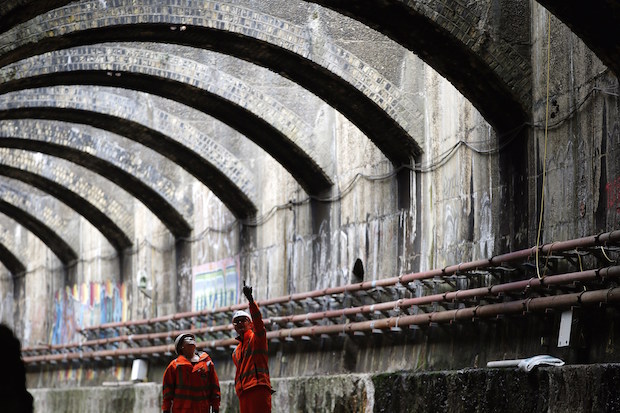‘It’s hard to know how to tell this story,’ she said as she began. ‘Because it’s so loaded. It’s so heavy-duty.’ Lore Wolfson was talking about the death of her husband, Paul, or rather about the onset of the illness that led him a year later to take an overdose of heroin, aged 61. He had been diagnosed with early-onset dementia, in a peculiarly aggressive form, rapidly losing his words, his memory, his capacity to work or function independently. Lore began recording her conversations with Paul very soon after they knew for sure why he was having word-finding difficulties. ‘It was the natural thing to do,’ she said, because she’s a radio producer and, for her, keeping an audio diary was more natural than writing things down. It was also, she now says, ‘a way of keeping Paul’s voice with me’.
Lore’s Story (Radio 4, Monday night) does sound in outline very ‘heavy-duty’, but as told by Lore and through Paul’s own words it was anything but heavy-laden. They go on holiday to the far north of Scotland, taking the night train and travelling first-class. Something Paul had always wanted to do but never done. The illness had begun to take hold of his mental functioning, and Paul knew by then ‘he was going somewhere unknowable’, but he was determined to enjoy it.
Paul was a psychiatrist and understood, with perhaps too much clarity, exactly how his illness would progress. He tells Lore that sooner rather than later there will be a sudden change and ‘my brain will stop working very well. My face will become different. And I won’t really have much of a memory left.’ It all sounds so very bleak (and especially because Paul’s first wife had spent years in a care home suffering from the degenerative condition, Huntington’s disease). But eavesdropping on their conversations was anything but depressing because of their frankness with each other, and their ability to think beyond the illness, beyond its horror and cruelty.
Paul starts losing his way once he leaves the house (Lore doesn’t know about this), but discovers that, whereas he used to think people were not very kind, in fact ‘most people are very kind’, helping him get back. In their last conversation, he tells Lore, ‘I’m not as important as I thought I was.’ But without bitterness, adding, ‘I think overwhelmingly that the children are important.’ He and Lore had two small children, aged six and nine, and most of all he wanted them to remember him as he was when well; not the incontinent, demented person he knew he would become, unable to recognise them and ‘not caring about them’.
When Lore discovered Paul’s body lying on the sofa, a photograph of his parents beside him, a bunch of flowers by the door, a Valium pill on her pillow, it was not so much of a shock because they had had this conversation. ‘I understood Paul’s thinking. It made sense to me.’
This was so intimate, so revealing, it could have felt like snooping or as if we were being given too much information. But actually it was just so truthful, so pragmatic, I would recommend this half-hour to anyone going through a similar experience.
It’s always a surprise when walking from the Spectator office round the corner into Parliament Square to see the imposing Victorian headquarters of the Institution of Mechanical Engineers. How prestigious engineers must once have been (so close to the heart of government). And how wealthy (it’s a very grand building).
In fact, engineering does still contribute 25 per cent towards the nation’s GDP but you would never think so from the way politicians so often forget its importance to the economy and from its loss of status among the professions (just compare the salaries of a top engineer with those of a doctor, head teacher or politician). It’s even more of a no-go area for young women, who are not encouraged to study the Stem (science, technology, engineering and maths) subjects at either school or university. In Britain’s Hidden Talent: Women Engineers (Radio 4, Friday) Susan Marling wanted to find out why Britain has the lowest percentage of women engineers in Europe, at just six per cent, the same percentage as in 1919.
Engineering is still ‘tragically misunderstood and undersold’, failing to advertise that it no longer requires blue overalls and de-greasing soap. On the contrary, it’s much more about designing software, overseeing the construction of Crossrail, or, in the case of Jane Wernick, designing the London Eye across the South Bank of the Thames. She’s a structural engineer, who loves ‘the beauty of the well-solved problem’ but despairs of the small number of women in her profession. (Other European countries such as Sweden can boast that 25 per cent of its engineers are women.)
Maybe this is all about to change? The boss of AECOM, the huge engineering firm behind the Crossrail project in London, has declared himself to be ‘a feminist’. Wernick, though, knows there is a long way to go. ‘I would like to be interviewed about a project one day,’ she told Marling, ‘and not about being a woman engineer.’






Comments